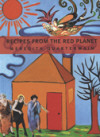Recipes from the Red Planet
Odd. There is just no other word to describe Meredith Quartermain’s collection of sixty short pieces. From the title, and even from the comments on the back of the book, I expected Martians and food. And while the collection contains both, neither one is the driving force. In fact, even having finished this volume, I am still asking that question: what propels these pieces? What is the organizing principle here?
Odd. There is just no other word to describe Meredith Quartermain’s collection of sixty short pieces. From the title, and even from the comments on the back of the book, I expected Martians and food. And while the collection contains both, neither one is the driving force. In fact, even having finished this volume, I am still asking that question: what propels these pieces? What is the organizing principle here?
The only satisfying answer is love of words. This is a collection that is rich in imagery and language. Not just language, but language about language: “I donned moody sentences, full of boisterous reserve.” Quartermain is an author who can write about writing and not make it seem maudlin or precious. A recurring theme in these sketches is the narrator who steps in to ask questions, as in the piece “A Marijuana Stalk,” when
The woodsman jumps off the dock and dives under the grey brown water towards a steep bank of tangled snowy bushes, leaving the narrator wondering how she will speak to her character. Is a narrator to her woodsman like a king to his army, or a mother to a son. Devil to disciple, or god to bewitched. Like language to word, or planet to plant.
There are several levels of meaning here, tantalizing and beguiling. It is rare to find an author able to write so bluntly and so artistically about language.
As often as I found myself impressed by the book’s twists and turns, as often as the language was rich and subtle and suggestive, there were moments when Quartermain lost control of the meaning and gave in to the art, as in “Heat Haze,” which opens: “Hills heads say. Hills hands hold. Hills hug. Hills hostage. They hang. Hundreds of hills hand dull.” And so on for a couple of pages. Whatever the meaning, it is quickly lost beneath the monotony and obscurity of the language. On the other hand, there are pieces that clobber the reader over the head with the lack of obscurity. Take, for instance, “(Elevator)”:
I step into its gilded, fluted columns. Top floor, s’il vous plait. Wouldn’t you rather go down, says the operator, there are many floors in the basement. All the pink floors are down there. Up please, I’m renovating the apartments in the penthouse. Floor three has very nice blue and pink arrangements. I must work on my renos. But you can’t. Why not? This is the Patriarchal Hotel.
Okay. I get it. For a writer, and a volume, defined by subtlety and delicate texture, pieces like this are leaden and depressing, and there are a few of them.
But my despair over such moments didn’t last long. Sections like “He Imagined a Seawall” offered strands of narrative amidst the imagery. Characters and places come alive with just enough frequency to keep the imagery from becoming overwhelming. And, best of all, much of the writing is simply breathtaking. Piece after piece left me pondering word choice, puzzling over all that a single noun could mean. The opening of “The Bat Experiment” was one such instance:
Bats aren’t blind. They’ve got eyes. You’re the one that’s blind. I’m going to perform an experiment to help you see at night. Did you know that one quarter of all mammal species are bats? I’m going to put some bats under the bed-covers with you. Bats are not rodents. They’re soft and furry. Their hands are wings that touch and hold. I want to find out how they’ll fly in the cave of your sleep. What they’ll do in your belfry. Will they ring your bells? And if they do, will you clatter, gurgle and snap, or hiss, boom, clink and whisper? Don’t worry – if they bother you, call me on the bedside phone.
The ideas here are delightfully simple—no tricks—yet also open up new vistas.
In short, it was difficult to make sense of the collection. There were stories with main characters and action and plot. There were pages of nonsense. There was beauty and frustration. There were reminders of what language could accomplish and what the limits of language might be. This volume occupies that magical, liminal space that might by anywhere and might be nowhere at all.





